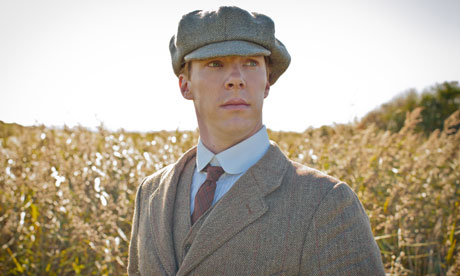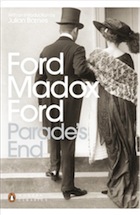Ford Madox Ford's Parade's End, adapted for the BBC by Tom Stoppard, is a masterpiece saturated with sex and features 'the most possessed evil character' in 20th-century fiction

Benedict Cumberbatch as Christopher Tietjens in the BBC production of Parade's End. Photograph: Nick Briggs/BBC/Mammoth Screen
In 1927, Ford Madox Ford compared himself to a great auk: that clumsy North Atlantic penguin, hunted to death by the middle of the 19th century. The occasion was the reissue of his first masterpiece The Good Soldier (1915) – his "great auk's egg" – which he had published at the age of 41. Even back then, he maintained, he had felt like an "extinct volcano", one who had had his time and was all too willing to hand over to the "clamorous young writers" of the rising generation. But those new voices – Imagists, Vorticists, Cubists – had been blown away by the first world war, and somehow he was still around. And so, to his own surprise, "I have come out of my hole again" to write more books … Such weary, genteel valetudenarianism was typical of Ford, and probably didn't help his reputation. When he died, in 1940, Graham Greene wrote that it felt like "the obscure death of a veteran – an impossibly Napoleonic veteran, say, whose immense memory spanned the period from Jena to Sedan".
 However, it was and is always a mistake to go along with Ford's self-presentation. He appeared confused and was often confusing; he would say one thing and probably mean another, only to state its opposite as a counter-certainty not very long afterwards; he was fanciful, unreliable and exasperating. Some thought him simply a liar, though as Ezra Pound charitably pointed out to Hemingway, Ford "only lied when he was very tired". So in 1927, for all his self-dismissingness, he was three-quarters of the way through what would become his second masterpiece: the four-book Parade's End (1924-28). A novel which couldn't be further from the work of some superannuated old buffer: in human psychology and literary technique, it is as modern and modernist as they come. And now that the years have shaken down, it is Ford who makes Greene look old-fashioned, rather than the other way round.
However, it was and is always a mistake to go along with Ford's self-presentation. He appeared confused and was often confusing; he would say one thing and probably mean another, only to state its opposite as a counter-certainty not very long afterwards; he was fanciful, unreliable and exasperating. Some thought him simply a liar, though as Ezra Pound charitably pointed out to Hemingway, Ford "only lied when he was very tired". So in 1927, for all his self-dismissingness, he was three-quarters of the way through what would become his second masterpiece: the four-book Parade's End (1924-28). A novel which couldn't be further from the work of some superannuated old buffer: in human psychology and literary technique, it is as modern and modernist as they come. And now that the years have shaken down, it is Ford who makes Greene look old-fashioned, rather than the other way round.
The Good Soldier's protagonist, Edward Ashburnham, was a version of the chivalric knight. Parade's End's protagonist, Christopher Tietjens, is a version of the Anglican saint. Both are great auks making do in a world of modernity and muddle. Tietjens – a North Yorkshireman whose ancestors came over with "Dutch William" – believes that the 17th century was "the only satisfactory age in England". He is "a Tory of an extinct type" who has "no politics that did not disappear in the 18th century". He reads no poetry except Byron, thinks Gilbert White of Selborne "the last English writer who could write", and approves of only one novel written since the 18th century (not that we can read it, since it is by a character in Parade's End). Both Ashburnham and Tietjens share a streak of romantic feudalism – nostalgia for a time of rights and duties and supposed orderliness. But Ashburnham is better fitted for the modern world, being – beneath his chivalric coating – a devious libertine and not outstandingly bright. Tietjens, by contrast, declares: "I stand for monogamy and chastity. And for no talking about it." He is also highly intelligent, with an encyclopaedic memory – "the most brilliant man in England", as we are frequently assured in the opening book, Some Do Not. This may be an advantage in the Imperial Department of Statistics, where he number-crunches for England; but isn't such a good idea in the world he inhabits.
Full piece at The Guardian
 However, it was and is always a mistake to go along with Ford's self-presentation. He appeared confused and was often confusing; he would say one thing and probably mean another, only to state its opposite as a counter-certainty not very long afterwards; he was fanciful, unreliable and exasperating. Some thought him simply a liar, though as Ezra Pound charitably pointed out to Hemingway, Ford "only lied when he was very tired". So in 1927, for all his self-dismissingness, he was three-quarters of the way through what would become his second masterpiece: the four-book Parade's End (1924-28). A novel which couldn't be further from the work of some superannuated old buffer: in human psychology and literary technique, it is as modern and modernist as they come. And now that the years have shaken down, it is Ford who makes Greene look old-fashioned, rather than the other way round.
However, it was and is always a mistake to go along with Ford's self-presentation. He appeared confused and was often confusing; he would say one thing and probably mean another, only to state its opposite as a counter-certainty not very long afterwards; he was fanciful, unreliable and exasperating. Some thought him simply a liar, though as Ezra Pound charitably pointed out to Hemingway, Ford "only lied when he was very tired". So in 1927, for all his self-dismissingness, he was three-quarters of the way through what would become his second masterpiece: the four-book Parade's End (1924-28). A novel which couldn't be further from the work of some superannuated old buffer: in human psychology and literary technique, it is as modern and modernist as they come. And now that the years have shaken down, it is Ford who makes Greene look old-fashioned, rather than the other way round.The Good Soldier's protagonist, Edward Ashburnham, was a version of the chivalric knight. Parade's End's protagonist, Christopher Tietjens, is a version of the Anglican saint. Both are great auks making do in a world of modernity and muddle. Tietjens – a North Yorkshireman whose ancestors came over with "Dutch William" – believes that the 17th century was "the only satisfactory age in England". He is "a Tory of an extinct type" who has "no politics that did not disappear in the 18th century". He reads no poetry except Byron, thinks Gilbert White of Selborne "the last English writer who could write", and approves of only one novel written since the 18th century (not that we can read it, since it is by a character in Parade's End). Both Ashburnham and Tietjens share a streak of romantic feudalism – nostalgia for a time of rights and duties and supposed orderliness. But Ashburnham is better fitted for the modern world, being – beneath his chivalric coating – a devious libertine and not outstandingly bright. Tietjens, by contrast, declares: "I stand for monogamy and chastity. And for no talking about it." He is also highly intelligent, with an encyclopaedic memory – "the most brilliant man in England", as we are frequently assured in the opening book, Some Do Not. This may be an advantage in the Imperial Department of Statistics, where he number-crunches for England; but isn't such a good idea in the world he inhabits.
Full piece at The Guardian
No comments:
Post a Comment